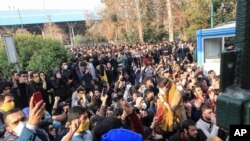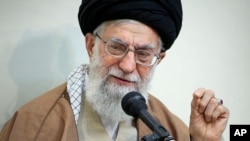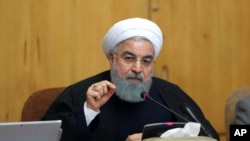Supporters of Iran’s government held demonstrations in cities across the country Wednesday following days of anti-government protests.
Iranian state television showed video of crowds waving Iranian flags and expressing support for Iran’s top leader.
Later in the day, Iran’s Revolutionary Guards said the anti-government protests were at an end. At least 21 people have died in the unrest over the past week.
Many of the anti-government protesters are angry about high unemployment and inflation. These conditions have continued even after the end of international sanctions in 2015. Those measures were designed to punish Iran for its nuclear activities.
In exchange for limits on its nuclear program, international powers cancelled trade restrictions and released billions of dollars of Iranian money.
But critics say the current president, Hassan Rouhani, has failed to use the money to improve the country’s economy.
Iran’s Supreme Leader, Ali Khamenei, blamed other governments for problems in the country.
“In recent days, enemies of Iran used different tools, including cash, weapons, politics and intelligence apparatus to create troubles for the Islamic Republic,” he said.
The Islamic Republic in Iran
Iran’s form of government is called an Islamic Republic. The republic is led by a president, who is directly elected by voters.
But in Iran, the position of Supreme Leader is above the president. The position is given to an Islamic scholar.
The Supreme Leader has power to appoint top government officials. They include commanders of the armed forces, the head of state radio and television, and members of national security councils.
The Supreme Leader also can make appointments to the Assembly of Experts. They form a group of experts who are knowledgeable in Islamic law, known as Sharia.
Ayatollah Ali Khamenei is the second man to hold the position since Iran declared itself an Islamic Republic in 1979.
The first, Ayatollah Ruhollah Khomeini, took power during the Iranian revolution, which ousted the Shah, Mohammad Reza Pahlavi. Khomeini ruled until his death in 1989.
The Supreme Leader can use his powers to design and supervise the general policies of the Islamic Republic. He can order special elections on important issues. He has powers over the armed forces. He can take command of the military or solve disputes between branches of the military.
In addition, the Supreme Leader has powers to approve election results, pardon or reduce sentences of people jailed for crimes and to approve the removal of a president.
In short, Iran’s Supreme Leader makes final decisions on the economy, environment, foreign policy, education, population growth and elections.
However, he is not directly elected.
The president of Iran is directly elected to a four-year term and is limited to two terms. However, he must answer to the Supreme Leader.
Rouhani is considered a moderate who supports improved ties with the West. He was elected to his second term in 2017. He follows Mahmoud Ahmadinejad who was considered a conservative.
Iran’s president leads the executive branch of government and can choose a cabinet with approval from parliament. He is deputy commander-in-chief of the armed forces. He also can declare emergencies or military rule.
The president also leads the National Security Council and the Supreme Council of the Cultural Revolution.
The Islamic Consultative Assembly is Iran’s lawmaking body. The assembly has 290 members. They can create propose and approve legislation so long as it is not in conflict with Islamic teachings. The Assembly can investigate issues affecting the nation and approve international treaties. It also can put questions to the president and hold a vote of confidence on the president’s election.
Reports note that the anti-government protests appear to be directed at Iran’s top leaders. Many of the protesters consider Rouhani corrupt. They also blame the Supreme Leader for the country’s condition.
The protesters say Iran should spend less money in places like Syria and Lebanon. Instead, they want more done to create jobs, to improve the economy and to limit corruption.
Some experts say women are taking part in the protests to call for equal rights.
I’m Ashley Thompson.
And I'm Mario Ritter.
Marissa Melton reported this story for VOA News. Mario Ritter adapted her report for Learning English. George Grow was the editor.
We want to hear from you. Write to us in the Comments section, and visit our Facebook page.
_______________________________________________________________
Words in This Story
sanctions – n. measures taken against a country to cause it to obey international rules usually by limiting trade
apparatus – n. an organization or system that operates something or carries out a broad task
scholar – n. a person who has studied a subject for a long time and knows a lot about it
cash – n. ready money
branch – n. a part of a larger organization; an extension of a tree
executive – adj. of or relating to the direction of people of things
confidence – n. a feeling that you can do something well








